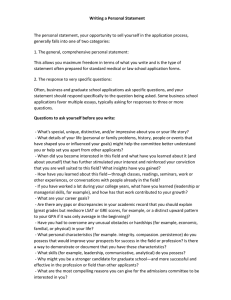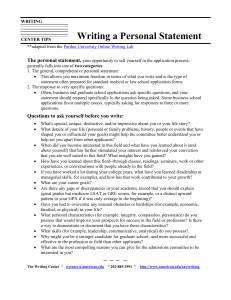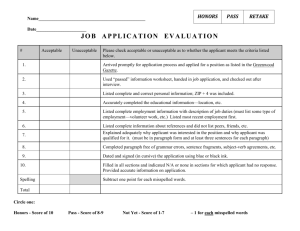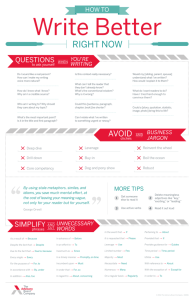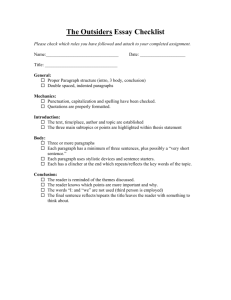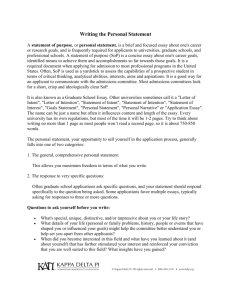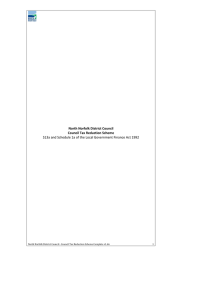Questions to ask yourself before you write:
advertisement
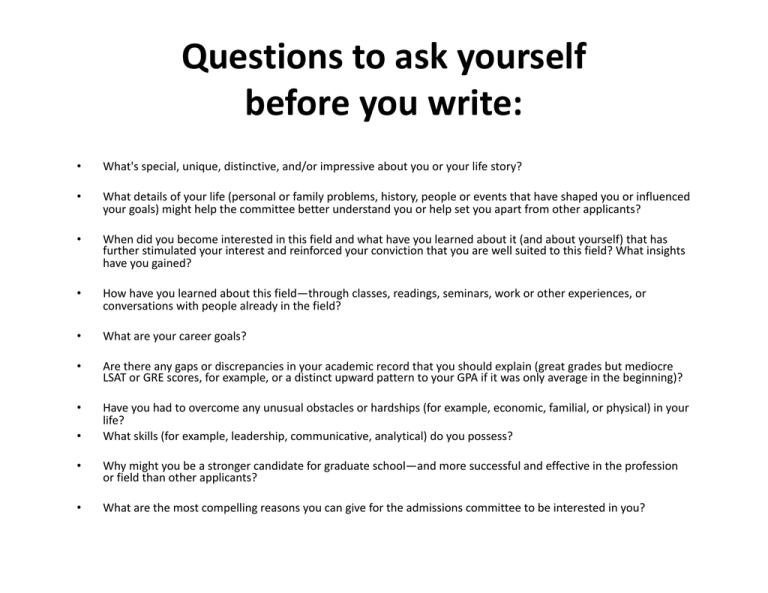
Questions to ask yourself before you write: • What's special, unique, distinctive, and/or impressive about you or your life story? • What details of your life (personal or family problems, history, people or events that have shaped you or influenced your goals) might help the committee better understand you or help set you apart from other applicants? • When did you become interested in this field and what have you learned about it (and about yourself) that has further stimulated your interest and reinforced your conviction that you are well suited to this field? What insights have you gained? • How have you learned about this field—through classes, readings, seminars, work or other experiences, or conversations with people already in the field? • What are your career goals? • Are there any gaps or discrepancies in your academic record that you should explain (great grades but mediocre LSAT or GRE scores, for example, or a distinct upward pattern to your GPA if it was only average in the beginning)? • Have you had to overcome any unusual obstacles or hardships (for example, economic, familial, or physical) in your life? What skills (for example, leadership, communicative, analytical) do you possess? • • Why might you be a stronger candidate for graduate school—and more successful and effective in the profession or field than other applicants? • What are the most compelling reasons you can give for the admissions committee to be interested in you? General advice • Answer the questions that are asked – • Tell a story – • Don't be tempted to use the same statement for all applications. It is important to answer each question being asked, and if slightly different answers are needed, you should write separate statements. Think in terms of showing or demonstrating through concrete experience. One of the worst things you can do is to bore the admissions committee. Be specific – Don't, for example, state that you would make an excellent doctor unless you can back it up with specific reasons. Your desire to become a lawyer, engineer, or whatever should be logical, the result of specific experience that is described in your statement. • Concentrate on your opening paragraph – • Tell what you know – • For example, references to experiences or accomplishments in high school or earlier are generally not a good idea. Do some research, if needed – • The middle section of your essay might detail your interest and experience in your particular field, as well as some of your knowledge of the field. Refer to experiences (work, research, etc.), classes, conversations with people in the field, books you've read, seminars you've attended, or any other source of specific information about the career you want and why you're suited to it. Don't include some subjects – • The lead or opening paragraph is generally the most important. It is here that you grab the reader's attention or lose it. If a school wants to know why you're applying to it rather than another school, do some research to find out what sets your choice apart from other universities or programs. Avoid clichés – A medical school applicant who writes that he is good at science and wants to help other people is not exactly expressing an original thought. Stay away from often‐repeated or tired statements. General Outline • Introductory Paragraph‐ setup the following: – Career goal and why it is your goal – Why you are applying to the particular program to achieve this goal • Middle Section‐ your interest and experience in your particular field, what makes unique – Outline research and classroom experience – Identify other activities or groups that have influenced you – Explain any situations that may have influenced gaps or discrepancies in your academic record, GREs etc BUT still highlight the positives more than the negatives • Conclusion – tie everything together and give the big final pitch to sell yourself Writing the Personal Statement: Top 10 Rules 1. Strive for depth rather than breadth. Narrow focus to one or two key themes, ideas or experiences 2. Try to tell the reader something that no other applicant will be able to say 3. Provide the reader with insight into what drives you 4. Be yourself, not the 'ideal' applicant 5. Get creative and imaginative in the opening remarks, but make sure it's something that no one else could write 6. Address the school's unique features that interest you 7. Focus on the affirmative in the personal statement; consider an addendum to explain deficiencies or blemishes 8. Evaluate experiences, rather than describe them 9. Proofread carefully for grammar, syntax, punctuation, word usage, and style 10. Use readable fonts, typeface, and conventional spacing and margins
